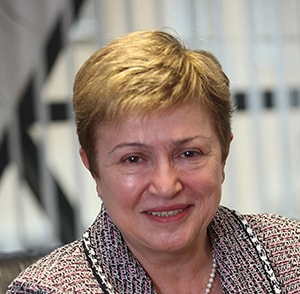The 66-year-old Bulgarian economist and former chief executive of the World Bank remains the only candidate to replace Christine Lagarde.

Following heated negotiations and two rounds of voting, Kristalina Georgieva is the pick of European countries to become the International Monetary Fund’s next managing director.
Under a convention dating back to 1946, the choice of who heads the IMF rests with Europe, while the United States always picks the World Bank chief (EU countries and the US together hold 46% of the votes at the IMF). Unless that convention is overturned or an unknown challenger emerges, the 66-year-old Bulgarian economist and former chief executive of the World Bank remains the only candidate to replace Christine Lagarde. Georgieva has been granted dispensation from the rule that a new IMF chief should not be older than 65 when appointed.
Georgieva’s nomination is seen as a victory for French President Emmanuel Macron and other southern European leaders who backed her. She will be the first Eastern European national to hold the top job at the Fund. A trained economist with more than 100 academic publications to her credit—including a textbook on microfinance—Georgieva is remembered by fellow students for playing the guitar and being the “life and soul” of the party.
Her first job at the World Bank was as an environmental economist, and she rose up the ranks to take charge of the global lender’s environmental strategy, policies and lending. After she joined the European Commission, she managed one of the world’s largest humanitarian-aid budgets and later oversaw the EU’s 161 billion euro ($178 billion) budget, tripling the amount of funding to tackle Europe’s refugee crisis.
With Georgieva at the helm, the IMF is likely focus more closely on development issues, climate change, and women’s participation in the workforce.
As a committed multilateralist and bridge-builder, she could move to rebalance the IMF’s governance to reflect the growing economic importance of China, India and other emerging nations.
Among the immediate challenges she will face is salvaging the record $57 billion bailout of Argentina and maintaining the IMF’s status and impartiality amid growing trade wars. She is also expected to ask the Fund’s shareholders to boost its reserves so that it can finance more IMF programs, which could be needed to address the impact of the global economic slowdown on heavily indebted nations.



